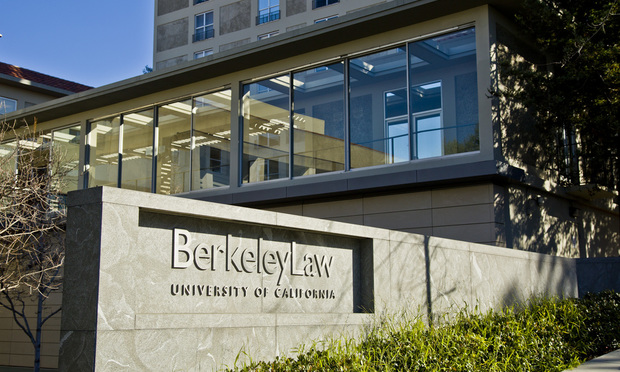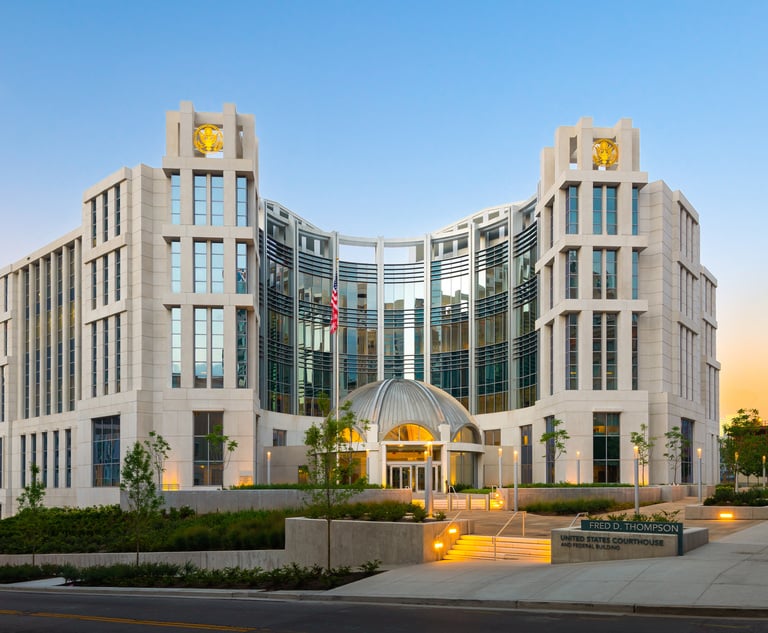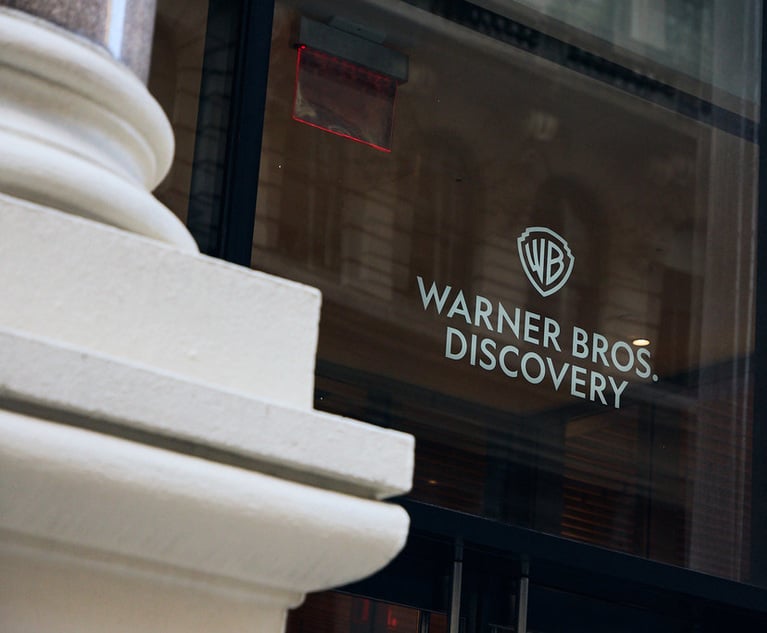Berkeley Law Is Deeply Divided on 'Boalt' Name, Chemerinsky Says
The University of California, Berkeley School of Law dean discusses the movement to remove references to John Boalt from the law school, and why people on both sides feel so strongly about the issue.
September 14, 2018 at 01:43 PM
6 minute read
The original version of this story was published on The Recorder
 University of California at Berkeley, School of Law. Photo: Jason Doiy
University of California at Berkeley, School of Law. Photo: Jason Doiy
The University of California, Berkeley School of Law has been known colloquially as Boalt Hall for decades, but that name could soon disappear from the Bay Area campus after information surfaced about the racist past of John Boalt—a 19th century California lawyer who pushed for the Chinese Exclusion Act.
A law school committee this week recommended the removal of the Boalt Hall name from one of the school's four buildings and that other references to Boalt in student organizations and elsewhere be excised. (The committee did not recommend stripping the Boalt name from two endowed professorships, which would require the involvement of the California attorney general.)
Berkeley is not the first law school to confront the legacy of a racist namesake. In July, a panel at Florida State University recommended stripping the name of former Florida Supreme Court Justice B.K. Roberts from the Tallahassee school. Roberts resisted racial integration efforts from the bench throughout the 1950s. And Harvard Law School in 2016 decided to do away with its official seal because it featured elements of the family coat of arms of early donor and slaveholder Isaac Royall Jr.
John Boalt in 1887 delivered a speech at the Berkeley Club called “The Chinese Question,” in which he argued that Chinese immigrants who immigrated to the state during the Gold Rush would never assimilate. The speech was circulated widely in the run-up to the 1882 Chinese Exclusion Act, which barred Chinese laborers from coming to the United States.
Boalt himself had no direct connections to the law school, but his widow, Elizabeth Josselyn Boalt, donated money to construct a law school building in 1906 in his name. The law school moved to a new building in 1950, a portion of which still bears the Boalt name. While many people referred to the school as Boalt Hall, the committee concluded that was never the school's official name. Rather, Boalt Hall refers to a specific building, according to the report.
The proposed renaming has touched a nerve with many on the law school community, some of whom refer to themselves as “Boalties.” We spoke with Dean Erwin Chemerinsky this week to find out what happens next and what he's hearing from students and alumni. His answers have been edited for length.
What happens now? Do you have a position on the renaming?
 Erwin Chemerinsky.
Erwin Chemerinsky.What I'm doing now is receiving comments from people on the committee report, and then I'll make a decision in November. The report came out Monday afternoon about 4 p.m. When I last checked my email this morning [Thursday] I had received more than 400 messages from alumni, faculty, staff and students, and I'm answering every single one of them individually. I'm going to wait to see what everybody has to say then think carefully about it and announce a decision. The committee has issued its report, and we're now at the stage where I'm receiving comments so that I can decide what is the best thing to do.
Is there any consensus among the comments you've received thus far?
I've not counted, but they are quite divided, and not in the way I would have predicted. I would have thought the alums from the earlier classes would be more tied to the Boalt name, and that current students wouldn't be attached to it. But I have plenty of alums from the 1960s and 1970s who are saying, “Change the name.” And I have plenty of current students saying, “Keep the name,” and vice versa. There's not the pattern I expected to see.
I'm also surprised that some younger students want to keep the Boalt name. What are their arguments?
Their arguments are like those who graduated earlier: Tradition, and the importance of it; a perception that Boalt is known as part of the brand of Berkeley Law; and also the ideological position as to when it's appropriate to change names. Those who oppose it say that we shouldn't be judging past actions by current values. On the other hand, those who support the change say [the school] has never officially been called Boalt—it has always been Berkeley Law School—and they believe we shouldn't name things after people who said vile, racist things.
Did you initially realize how controversial this issue would be?
The stories about John Boalt being a racist came out before I took over as dean. As soon as I arrived, there was substantial pressure from a number of students and alums to remove the use of the Boalt Hall name. In October, I created the committee.
I had heard enough from people at that point to expect that it would be controversial. What was most important for me was to create a process that was thorough, where everyone would have a chance to feel they were heard. The committee solicited written comments and held a public forum. It was very careful in its analysis. I decided I'd release the report to the law school community, then take about six weeks to hear what people say. There are intense emotions on both sides.
What was the atmosphere like at the forum on the name change?
The atmosphere was wonderful and remarkably civil. Careful arguments were presented on all sides. Everybody treated everyone else with great civility. It was really the ideal of what a law school and university should be, with a sense of reasoned disagreement. People feel strongly but they engage in civil discourse.
What was your initial reaction to reading John Boalt's “The Chinese Question”?
John Boalt said very vile and racist things. I think the question is: What to do with that today, in light of the history of how the Boalt name came to be use in the law school?
Colleges and universities are facing this all over the country. It's inherently a divisive issue. For me, one of the hard things as dean is that whatever I decide, I'm going to please about half the people, and upset about half the people. They all feel strongly. Of those who care, it seems pretty closely divided. I wish I could find a path that would make everybody happy.
This content has been archived. It is available through our partners, LexisNexis® and Bloomberg Law.
To view this content, please continue to their sites.
Not a Lexis Subscriber?
Subscribe Now
Not a Bloomberg Law Subscriber?
Subscribe Now
NOT FOR REPRINT
© 2025 ALM Global, LLC, All Rights Reserved. Request academic re-use from www.copyright.com. All other uses, submit a request to [email protected]. For more information visit Asset & Logo Licensing.
You Might Like
View All
COVID-19 Vaccine Suit Against United Airlines Hangs on Right-to-Sue Letter Date
3 minute read
Lavish 'Lies' Led to Investors Being Fleeced in Nine-Figure International Crypto Scam
3 minute read
Trending Stories
- 1Public Notices/Calendars
- 2Monday Newspaper
- 3Judicial Ethics Opinion 24-98
- 4'It's Not Going to Be Pretty': PayPal, Capital One Face Novel Class Actions Over 'Poaching' Commissions Owed Influencers
- 511th Circuit Rejects Trump's Emergency Request as DOJ Prepares to Release Special Counsel's Final Report
Who Got The Work
Michael G. Bongiorno, Andrew Scott Dulberg and Elizabeth E. Driscoll from Wilmer Cutler Pickering Hale and Dorr have stepped in to represent Symbotic Inc., an A.I.-enabled technology platform that focuses on increasing supply chain efficiency, and other defendants in a pending shareholder derivative lawsuit. The case, filed Oct. 2 in Massachusetts District Court by the Brown Law Firm on behalf of Stephen Austen, accuses certain officers and directors of misleading investors in regard to Symbotic's potential for margin growth by failing to disclose that the company was not equipped to timely deploy its systems or manage expenses through project delays. The case, assigned to U.S. District Judge Nathaniel M. Gorton, is 1:24-cv-12522, Austen v. Cohen et al.
Who Got The Work
Edmund Polubinski and Marie Killmond of Davis Polk & Wardwell have entered appearances for data platform software development company MongoDB and other defendants in a pending shareholder derivative lawsuit. The action, filed Oct. 7 in New York Southern District Court by the Brown Law Firm, accuses the company's directors and/or officers of falsely expressing confidence in the company’s restructuring of its sales incentive plan and downplaying the severity of decreases in its upfront commitments. The case is 1:24-cv-07594, Roy v. Ittycheria et al.
Who Got The Work
Amy O. Bruchs and Kurt F. Ellison of Michael Best & Friedrich have entered appearances for Epic Systems Corp. in a pending employment discrimination lawsuit. The suit was filed Sept. 7 in Wisconsin Western District Court by Levine Eisberner LLC and Siri & Glimstad on behalf of a project manager who claims that he was wrongfully terminated after applying for a religious exemption to the defendant's COVID-19 vaccine mandate. The case, assigned to U.S. Magistrate Judge Anita Marie Boor, is 3:24-cv-00630, Secker, Nathan v. Epic Systems Corporation.
Who Got The Work
David X. Sullivan, Thomas J. Finn and Gregory A. Hall from McCarter & English have entered appearances for Sunrun Installation Services in a pending civil rights lawsuit. The complaint was filed Sept. 4 in Connecticut District Court by attorney Robert M. Berke on behalf of former employee George Edward Steins, who was arrested and charged with employing an unregistered home improvement salesperson. The complaint alleges that had Sunrun informed the Connecticut Department of Consumer Protection that the plaintiff's employment had ended in 2017 and that he no longer held Sunrun's home improvement contractor license, he would not have been hit with charges, which were dismissed in May 2024. The case, assigned to U.S. District Judge Jeffrey A. Meyer, is 3:24-cv-01423, Steins v. Sunrun, Inc. et al.
Who Got The Work
Greenberg Traurig shareholder Joshua L. Raskin has entered an appearance for boohoo.com UK Ltd. in a pending patent infringement lawsuit. The suit, filed Sept. 3 in Texas Eastern District Court by Rozier Hardt McDonough on behalf of Alto Dynamics, asserts five patents related to an online shopping platform. The case, assigned to U.S. District Judge Rodney Gilstrap, is 2:24-cv-00719, Alto Dynamics, LLC v. boohoo.com UK Limited.
Featured Firms
Law Offices of Gary Martin Hays & Associates, P.C.
(470) 294-1674
Law Offices of Mark E. Salomone
(857) 444-6468
Smith & Hassler
(713) 739-1250









